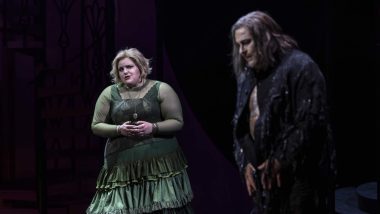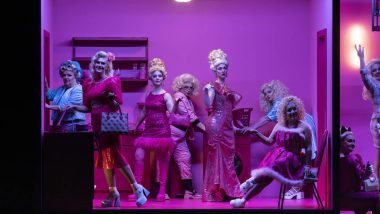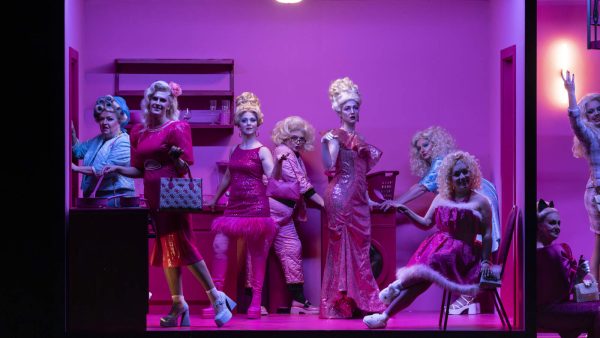 Sweden Wagner, Der fliegende Holländer: Soloists, Gothenburg Opera Chorus and Orchestra / Alevtina Ioffe (conductor). Gothenburg Opera main stage, 25.2.2024. (NS)
Sweden Wagner, Der fliegende Holländer: Soloists, Gothenburg Opera Chorus and Orchestra / Alevtina Ioffe (conductor). Gothenburg Opera main stage, 25.2.2024. (NS)

Production:
Director – Alessandro Talevi
Set design – David Hohmann
Costume design – Pascal Seibicke
Lighting design – Marco Giusti
Cast:
Daland – Mats Almgren
Senta – Åsa Jäger
Erik – Kjetil Støa
Mary – Katarina Giotas
Steersman – Daniel Ralphsson
The Dutchman – Craig Colclough
Director Alessandro Talevi’s first production for the Gothenburg Opera is a good example of a directorial ‘concept’ working with rather than against the libretto. In fact, the storytelling is gripping, helped by the choice to perform the whole opera without a break (as Wagner originally intended). Talevi sees Wagner’s Der fliegende Holländer as a criticism of greed and status-obsession and sets the story in a late-twentieth century with Barbie-fied, objectified women and men obsessed with money and sex. Only Senta, Erik and the Dutchman have different priorities from thoughtless consumption.
David Hohmann’s set designs worked brilliantly, with an impressive three-storied house for Daland which was both full of action and worked well acoustically for the singers. In ‘Summ und brumm, du gutes Rädchen’ the house was filled with women spinning exercise bikes, prettifying themselves and preparing for the return of the sailors under the leadership of a cynical Mary (brilliantly acted by Katarina Giotas). Pascal Seibicke’s costumes were eye-poppingly colourful and obviously Barbie-inspired (though the programme book is at pains to point out that the concept was conceived long before the release of the Barbie film). The ladies of the Gothenburg Opera chorus sang with verve and threw themselves into their parts both in this scene and in the party scene.

The male chorus were vocally stunning in each of their scenes, and the Dutchman’s ghostly crew were especially chilling. The staging of the party scene was gripping as the goading of the sailors and girls on the shore finally led the cursed crew to break their silence. The circle of metal silhouettes of men used to represent the Dutchman’s ship is brilliantly combined with video to great effect every time it is seen on stage. Daniel Ralphsson made a convincingly sleepy Steersman and sang ‘Mit Gewitter und Sturm aus fernem Meer’ with a nice sense of yearning for home.
Mats Almgren captures the different aspects of Daland’s character, colouring his voice and his acting with Daland’s cupidity on discovering the wealth the Dutchman offers but also with fatherly pride in Senta (although Daland seems to value Senta more for the superb husband she attracts than as his loving daughter). Kjetil Støa makes his Wagner debut in this production, but one would not think so from his confident and impassioned tenor. Støa’s Erik is suffering from his rejection by Senta but retains his dignity, ending with a terrific final duet with Senta.
Åsa Jäger’s magnificent Wagnerian soprano is perfect for Senta, with excellent projection through her register, an attractive warm timbre and a very free top. She is also a subtle actor, believable in Senta’s teenage swings between obsessive certainty and vulnerability. Her singing of Senta’s ballad was compelling, and she was no shrinking violet in her duets with the Dutchman. Jäger has already sung Brünnhilde in Germany and should have more Wagner roles soon after her terrific performance in Gothenburg.
Craig Colclough was superb as the Dutchman, with a stage presence that gripped even before he started singing. ‘Die Frist ist um’ was a wonderful demonstration of Colclough’s expressive bass-baritone and a beautifully controlled dynamic range with excellent projection throughout. His acting thoughtfully showed both the Dutchman’s otherness and his residual humanity. If this artist is billed at your local opera house, buy tickets immediately!
Alevtina Ioffe’s conducting reflected the intensity of Wagner’s music without fail, and adeptly brought out the contrasts in dynamics and atmosphere without the story ever seeming to drag. The Gothenburg Opera orchestra responded with a gorgeous sound and sensitive balance with the singers. Musically, vocally and visually this is a stunning production and a showcase of just how good Der fliegende Holländer can be.
Niklas Smith
Playing until 4 April 2024. Aivis Greters conducts on 29 February, 8 and 13 March and 4 April. For tickets and more information see the Gothenburg Opera website here.
